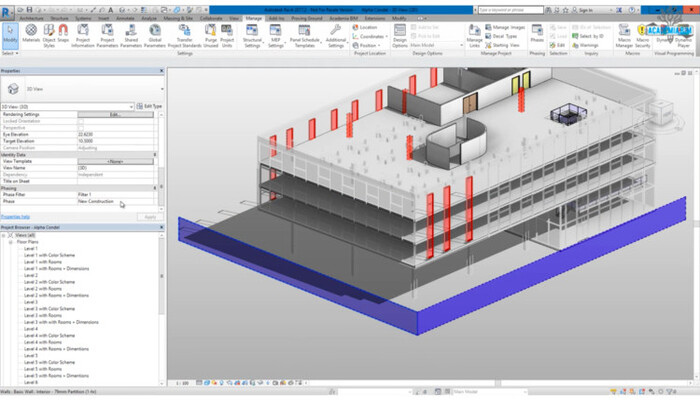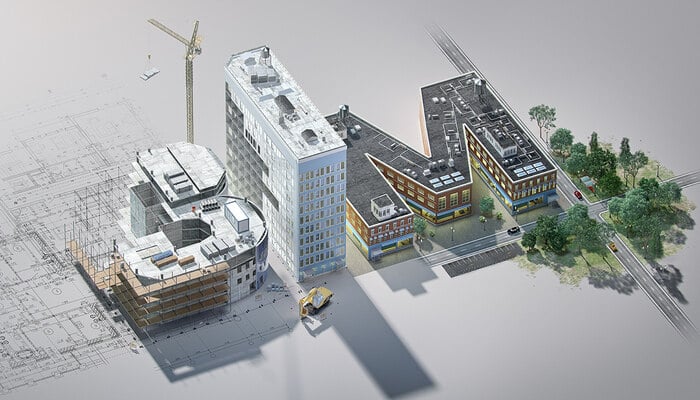5 Best BIM Courses in Pune for Civil Engineers You Must Know (2025)

Table of Contents
Civil Engineering as a profession is booming. The number of construction and infrastructure projects around us validates this fact. Mentioned below is a research statistic that supports our statement.
“The global civil engineering market size was estimated at USD 8,652.3 billion in 2022 and is expected to expand at a compounded annual growth rate (CAGR) of 5.9% from 2023 to 2030.”
Given the rate at which the civil engineering industry is evolving, professionals must be more agile, adaptable, and innovative. This is where technology can be of help. Cutting-edge processes such as Building Information Modelling (BIM) can help civil engineers keep up with the rising demands of the industry. Especially in Pune, BIM is a highly discussed topic. A range of BIM courses in Pune are available. This blog talks about the right BIM classes in Pune for various professional needs and from different career standpoint.
Keep reading to find out.
What is Building Information Modeling (BIM) for Civil Engineers?
BIM is a comprehensive three-dimensional digital representation of a building or infrastructure project’s physical and functional elements. It showcases details of the structure, including walls, beams, pipes, electrical lines, Heating Ventilation and Air conditioning (HVAC) systems, and more. This rich digital model serves as a collaborative platform that allows civil engineers, architects, contractors, and other stakeholders to work together seamlessly throughout the project's lifecycle.
Read: 6 Best Courses for Civil Engineers to Take Their Career to the Next Level
7 Important Advantages of BIM for Civil Engineers

BIM has emerged as a game-changer in the field of civil engineering. This innovative digital approach to construction and infrastructure projects has revolutionised the way engineers plan, design, and manage projects. Let’s look at the fundamental benefits of BIM for civil engineers.
1. Enhanced Design and Visualisation
Civil engineers can visualise the entire structure, including all its components, systems, and materials. This enables them to detect and address potential design conflicts and issues early in the planning phase, reducing costly rework during construction.
2. Improved Collaboration
BIM fosters seamless collaboration among project stakeholders, including architects, structural engineers, contractors, and owners. Everyone works on a centralised platform, accessing the same up-to-date information.
3. Clash Detection and Conflict Resolution
BIM's 3D models facilitate clash detection by highlighting areas where different building elements intersect or conflict. This feature helps engineers identify potential issues early, avoiding costly rework and construction delays.

4. Cost Estimation and Budget Control
BIM provides accurate and detailed data that aids in cost estimation and budget management. Engineers can generate comprehensive Bills Of Quantities (BOQs) directly from the BIM model, allowing for more precise cost projections.
5. Improved Sustainability and Energy Efficiency
Civil engineers can use BIM to analyse and optimise a project's sustainability and energy performance. BIM software allows for simulations that help determine the most energy-efficient systems and materials.
6. Streamlined Project Scheduling
Civil engineers can create construction schedules based on the 3D model, enabling better coordination of activities and resources. This leads to improved project timelines, reduced downtime, and enhanced onsite productivity.
7. Facility Management and Maintenance
BIM’s detailed digital model can be utilised for facility management and maintenance purposes. Professionals can access information about the building's systems, components, and maintenance history, making it easier to conduct repairs and renovations.
Also Check : In Demand Jobs and Salaries using BIM Expertise in Civil Engineering
How Can Civil Engineers Learn BIM?

Civil engineers can essentially learn BIM for real-world applications in two ways. Let’s have a look at these two approaches.
1. Formal Education
Individuals can seek admission to universities that offer a BIM course for civil engineers. These programs provide a comprehensive understanding of BIM and its application in projects. They provide software training, theory knowledge, and practical insight- all delivered through industry experts. Completing such programs provides a recognised qualification or certification that can be helpful for civil engineers while applying for jobs.
2. Virtual Learning
If the formal education route is taxing for civil engineers given their hectic schedule, they can also use online resources for self-study. You can explore an online BIM course for civil engineers offered by platforms such as Novatr, Coursera, and Udemy to learn in-depth about the applications of BIM. Through such online upskilling courses, engineers can learn at their own pace and choose resources that match their career goals.
How Much Does a BIM Course Cost in Pune, India?
The cost of a BIM course in India can vary significantly depending on several factors, including the level of the course (basic, intermediate, or advanced), the institution or training provider, and the duration of the program. On an average, a basic introductory BIM course for civil engineers can range from INR 10,000 to INR 30,000, while advanced or specialised courses can cost between INR 50,000 to INR 3,00,000. Additionally, university courses may cost anywhere between INR 3,00,000 to INR 10,00,000.
To select the right BIM course for civil engineers, it's essential to research and compare various options that align with your budget and learning objectives.
Top 5 BIM Courses for Civil Engineers in Pune
Finding the most suitable BIM course for civil engineers can be an overwhelming process. So if you are wondering which institute is best for a BIM course, we have figured out the answer for you. Let’s have a look at the top BIM courses in Pune for civil engineers.
1. BIM Professional Course for Civil Engineers by Novatr
Mode of Learning: Online
Duration: 7 months
Placement Assistance: Yes

This BIM course for civil engineers by Novatr is a one-of-its-kind course tailored specifically to meet the evolving needs of the Architecture, Engineering and Construction (AEC) industry. The course curriculum provides extensive knowledge of Revit and 10+ BIM software with industry workflows. The program also shares insights about construction techniques and quantification such as precast, rebar, and project scheduling.
This BIM training is taught by industry experts and allows participants to experience applications of BIM in their field of work through RIBA-approved capstone projects. The platform also provides placement assistance in top global firms and helps civil engineers achieve the peak of their careers.
2. BIM Course in Pune by IFS Academy
Mode of Learning: On Campus
Duration: 4 months
Placement Assistance: Yes
This postgraduate BIM course in Pune by IFS Academy offers training in BIM and Structural Design Analysis. It is a comprehensive program designed to equip professionals with the skills and knowledge needed to excel in the fields of structural engineering and construction design. This BIM training provides complete knowledge of BIM fundamentals, tools, software, methodologies, and ideal industry practices.
The key focus areas of the course curriculum include civil work, architecture, and Mechanical, Electrical, and Plumbing (MEP). This BIM course in Pune is taught by industry experts who provide practical insights into the applications of BIM. Individuals also get the opportunity to work on real-world projects and practice-based exercises. Through this cohort-based course, learners can network and collaborate to evolve as excellent professionals.
3. BIM Course in Pune by Infini
Mode of Learning: On-Campus and Online
Duration: 3 months
Placement Assistance: Yes
Infini Institute of Construction Project Management offers a short-term BIM course in Pune. The program can be pursued by students and graduates of architecture, engineering, and interior design fields. The curriculum of this BIM training course is tailored to equip learners with industry applications of BIM and its workflows. Individuals can hone their skills by learning through engaging case studies and working on real-world projects.
This BIM course in Pune provides technical knowledge of software like Revit Architecture, Structure, MEP, Navisworks, and BIM 360. The program also provides extensive knowledge about using BIM to improve team collaboration, elevate the quality of execution, enhance project management, and resolve conflicts on-site. By enrolling for the course, learners can also avail certification that can be useful while seeking job placements.
Read more: Masters Vs Certificate Courses: Which is Better for Architects and Engineers?
4. BIM Course for Civil Engineers by SW Systems
Mode of Learning: On-Campus and Online
Duration: 3 months
Placement Assistance: Yes
Called the Autodesk BIM Training, this BIM course in Pune offered by SW Systems is a wholesome program for civil engineers to advance their careers to the next level. This program can be undertaken by both students and professionals of civil engineering. This BIM training’s curriculum offers intense training on the topics of architectural modelling, landscaping, design visualisation, estimation, documentation, team coordination, structural detailing and modelling, along with BIM software and workflows.
Throughout the course, you will get hands-on training by collaboratively working on a project. By enrolling for this BIM course in Pune, you can learn from industry experts who have extensively worked in the field. You can also get assistance for portfolio making and interview preparation, thereby making you job-ready.
5. BIM Course by SevenMentor
Mode of Learning: Online
Duration: 140- 170 hours
Placement Assistance: Yes
This BIM training program offers a comprehensive insight into BIM software like Revit Architecture and MEP, Naviswork, and BIM 360. This BIM training aims to equip participants with technical knowledge about BIM tools and their industry workflows. The curriculum also includes a capstone project to apply their knowledge to real-life design challenges. Also, the course is delivered by industry experts with thorough knowledge of the practical applications of BIM on projects across the globe.
Also Explore - Top 5 BIM Courses in Bangalore
In Conclusion
As a civil engineer, learning BIM in 2024 can be your smartest investment of time, money, and effort. It will prepare you for the future of work, making you more desirable to top construction companies hiring for BIM-related roles. This will give you a competitive edge above your peers thereby helping you achieve exponential career growth.
As a platform invested in upskilling AEC professionals, Novatr offers one of the best BIM courses for civil engineers. Explore the BIM Professional Course for civil engineers today.
Frequently Asked Questions:
1. What are the BIM Course fees in Pune?
On an average, a basic introductory BIM course for civil engineers can range from INR 10,000 to INR 30,000, while advanced or specialised courses can cost between INR 50,000 to INR 3,00,000. Additionally, university courses may cost anywhere between INR 3,00,000 to INR 10,00,000.
2. What is the eligibility criteria for BIM Course in Pune?
BIM courses can be taken up by final year engineering students and those professionals who want to upskill in BIM.
3. Which are the top 5 institutes for BIM Course in Pune?
The Top Five institutes include; Novatr, IFS Academy, Infini, SW Systems and SevenMentor.

 Thanks for connecting!
Thanks for connecting!




.png)
.jpg)


-1.png)


